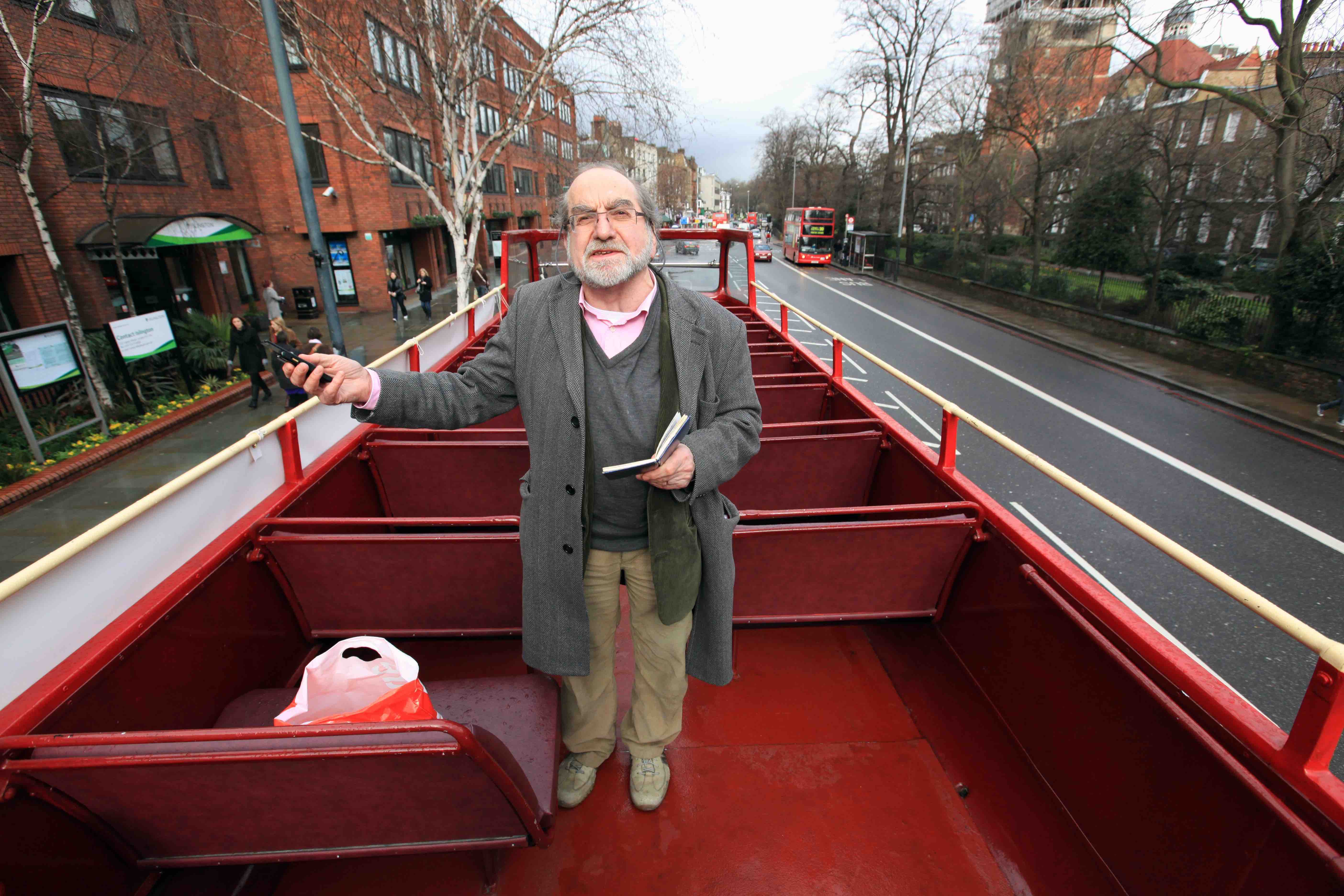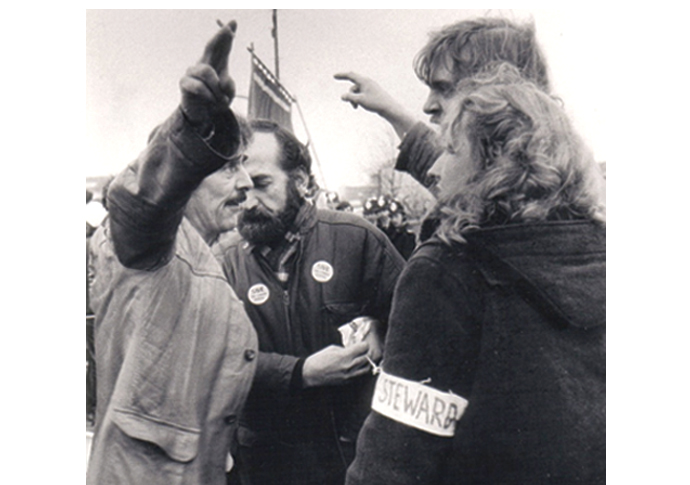Tributes to the editor who gave Islington a new campaigning voice
Tribune founder Eric Gordon, who died this week aged 89, was a maverick and an enigma who ran one of the last local independent titles, putting readers before shareholders
Friday, 9th April 2021 — By Calum Fraser and Helen Chapman and Richard Osley

Eric Gordon in the Islington Tribune offices, contemplating a last-minute front page change
ERIC Gordon – the founding editor of the Islington Tribune – passed away on Monday after a short illness.
The 89-year-old had been our only editor since the newspaper’s formation in 2003.
His age may have made him the UK’s oldest editor still regularly at work – and still he rarely booked a holiday.
Last year, he celebrated with staff as the team won three more awards at the Regional Press Awards.
As editor of one of the last independent titles in the UK, he was proud of the newspaper’s freedom from large groups and championed a co-op style structure, warning that papers would struggle to survive if they had to answer to faraway group executives or distant shareholders seeking dividends each year.
But even before the creation of the Tribune – and before that the award-winning Camden New Journal – and his relentless drive to keep on working into his 80s, Eric had lived a life like few others.
In 1967, he spent two years under house arrest in China with his first wife and son.
He had been accused of being a spy by the Chinese authorities when he was found with notes about the Cultural Revolution while working in a commune.
He planned to write a book, but found himself being held for two years in a hotel room – a case which became an international incident and sparked much press interest back in the UK.
Right up to his final days, he was authoring weekly columns and had planned to document his recent experience in hospital.
As our editor, he never took no for an answer and set the paper up to scrutinise public authorities, as well as the big businesses looking to wield power in Islington.
He never lost his thirst for the task ahead and was still sending out orders last week for articles to be written. The towing away of his wife’s car left him enraged from his hospital bed.

Eric Gordon on top of the Tribune’s battle bus
As news of his death spread, we were deluged with tributes.
One that tugged on the emotions came from Adrian Betham of the Better Archway Forum, who said of Eric’s death: “This is the first thing he has done to disappoint me – and no doubt so many other readers.”
Author Michael Rosen said: “He came from a background similar to my parents, so saying goodbye feels like I am saying goodbye to that world of 1930s, 1940s Jewish East End.”
Islington South MP Emily Thornberry said: “I invited him over for a drink in the House of Commons and he was very evasive to start with. It took a lot of work to get him down but he eventually did. The two of us basically spent the whole afternoon in Strangers sharing stories.
“He was an enigmatic figure. After that, I would then see him pop up at the most unlikely events and you’d wonder why is he here? But he always had a great mixture of two things, an eye for a story and a profound distrust for the establishment. I include Labour MPs in that.”
She added: “I have absolutely no doubt that the Islington Tribune really has helped with binding our community together.”
He was buried at a service at the Jewish Cemetery in Brighton yesterday (Thursday).
Islington North MP Jeremy Corbyn who had known Eric since supporting strikes for journalists with the NUJ in the 1970s, told those gathered how important the Tribune had been in recent campaigns to protect the accident and emergency departments at the Whittington Hospital.
Catherine West, the Hornsey and Wood Green MP, who served as the leader of Islington Council before getting elected to parliament said: “I knew him 15 years ago at a time when the Tribune was just starting out and I was leader of the opposition. We both shared a love for China, I used to live there for a year, and we often spoke about that. He was full of ideas.”

She added: “He also taught me a lot about presentation and leadership. I remember at one Town Hall meeting I became rather shouty and afterwards Eric said to me it is best to win people over through persuasion and argument rather than shouting.
“He understood about succession and I am sure we will still be enjoying stories in the Tribune in the years to come.”
The Tribune was created in a bid to replicate the success of the Camden New Journal. Eric had identified a similar news territory – a bursting rich mix of culture and history, but an inequality between the wealthy and the disadvantaged.
It was a financial gamble – papers were already closing, rather than opening at the time – but Eric’s overriding aim was always to provide a voice to those struggling to be heard.
The newspaper, like the CNJ, should not have a cover price so it would be free to all.
And the motto was “open to all, coerced by none” as well, which meant it didn’t matter what colour your political rosette was – if you had a story, you could be included.
Former Lib Dem council leader Terry Stacy tweeted this week how Eric would be missed, while Green councillor Caroline Russell said he left “an incredible legacy”, adding: “Eric Gordon has hugely influenced community life in Islington with the Tribune ’s reliably interesting coverage of issues and events in the borough.”
Eric had worked on a series of papers around the country before taking the helm at the old Camden Journal. When attempts were made to shut it down in 1980, a 16-month strike began which eventually led to the formation of the CNJ.
His belief, one supported by the staff, was that newspapers should concentrate on the core duty of providing a challenging local paper; and cover their costs rather than worrying about accruing dividends for outside shareholders.
As Don Ryan, the distribution manager since the 1980s, explained: “Eric’s legacy, in addition to the newspapers, are the values and beliefs that always guided his editorship and management.
“These are anchored in the unshakable belief that a newspaper should belong to and serve its readers and that profit should never be the primary motivation.”
Council leader Richard Watts said: “He was a giant of local media, a keen scrutineer and completely committed to his values.”
Eric would brush aside such plaudits, and might even think our coverage today was over the top, perhaps he’d be ordering reporters back to work on investigations.
After all, he often said he’d rather not use the word “boss” in the paper; if anybody was the bosses, it was the readers – his evergreen mantra.
Two weeks ago, he had a fall outside his home in Primrose Hill and medical complications followed in hospital. He was not suffering from the coronavirus.
Eric leaves his wife Samantha, sons Kim and Leigh and daughter Elly, five grandchildren and one great-granddaughter.
Strike! The journalists who stood up to cuts…

WITHOUT the Camden New Journal, there would be no Islington Tribune.
And without the brave journalists who stood up to cuts in 1980, there would be no Camden New Journal.
For 16 months, staff at Courier newspapers – a group which included the old Camden Journal and the Islington Gazette – waged a defiant strike after nine reporters were fired just before Christmas.
Journalists from other newspapers in London and beyond joined the protests, fearing the trend of closures elsewhere.
In the final settlement, it was agreed that the title – Camden Journal – would be sold for £1. The “New” was added to indicate the fresh start as an independent.
Eric was asked for many years to try something similar in Islington before taking the plunge.